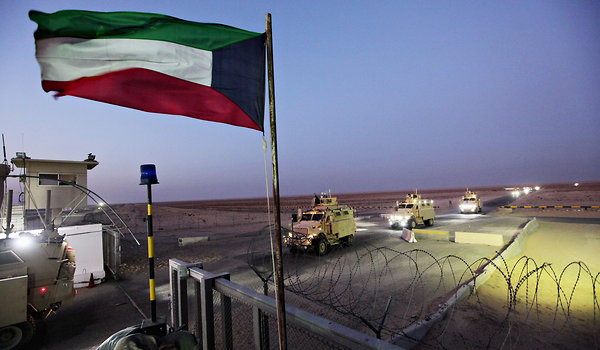The Status of Forces Agreement in Iraq, signed by Prime Minister Nouri al Maliki and President George W. Bush in 2008, established a clear withdrawal plan for all “combat” forces by December 31, 2011. There was, however, an understanding among many U.S. officials that a renegotiated agreement would have to be made so that American forces could stay in order to continue the development of the Iraqi Security Forces.
In 2011, the U.S. made repeated
statements that it would continue to assist the Iraqi government if a
small force were allowed to stay behind and the Iraqis seemed to
genuinely appreciate the offer. Yet as the months went by, and the
number of troops Washington was willing to keep in country dropped,
the certainty of an American troop presence became unclear to both
the U.S. and Iraqi governments.
By mid-October 2011, however, little
headway had been made in establishing an agreement over what future
American troop presence would look like in Iraq. The deal-breaker
was over legal protections for American troops. Allowing foreign
troops legal immunity was seen by many Iraqis as a sacrifice of their
sovereignty and a continuation of the American occupation. Incidents
such as the abuses at Abu Ghraib prison and the Haditha massacre were
still fresh in the minds of many Iraqis, and they and their leaders
wanted American troops subject to Iraqi law. No American commander
wanted to run the risk of one of their troops ending up in an Iraqi
courtroom if they were forced to defend themselves.


Even if these legal issues had been
resolved, there was little political capital in either country to
back continued American involvement in Iraq. Both President Obama
and Prime Minister Maliki had staked their political fortunes on
campaign promises to end American occupation, and in withdrawal
President Obama could claim he “ended the war in Iraq” and
President Maliki strengthened Iraqi sovereignty.
So, on December 16, 2011, the last American troops left Iraq, save
for some 160 Soldiers attached to the U.S. Embassy. Since then, the
country has quickly slid back into sectarian violence and insurgency.
Last month, sectarian violence and terrorism killed 659 Iraqis and
injured almost 1,400, according to casualty figures released by the
United Nations Assistance Mission for Iraq. This year, 7,157
civilians and 952 Iraqi security forces have died in sectarian
violence, according to U.N. figures.
As we approach the
expected withdrawal of American troops from Afghanistan at the close
of next year, the Afghan government of President Hamid Karzai faces
similar choices as the Iraqi government did in 2011. Karzai is in a
much better political position than the one Maliki found himself in
two years ago. President Karzai's own Loya Jirga, or Counsel of
Elders, has urged him to sign the Bilateral Security Agreement (BSA)
which will allow for a continued American troop presence in
Afghanistan.
Prime Minister Maliki lacked Parliamentary support in general for any continued American presence, especially one in which they viewed as a continued infringement of Iraqi sovereignty. These same issues have been brought up, but with much more success in Afghanistan. There, American troops would still retain immunity, but be highly restricted in their interactions with local Afghans. The servicemen and women continuing on in Afghanistan would be based at a few large, secure forward operating bases, and their primary mission would be the training and equipping of the Afghan National Army and Afghan National Police.
Prime Minister Maliki lacked Parliamentary support in general for any continued American presence, especially one in which they viewed as a continued infringement of Iraqi sovereignty. These same issues have been brought up, but with much more success in Afghanistan. There, American troops would still retain immunity, but be highly restricted in their interactions with local Afghans. The servicemen and women continuing on in Afghanistan would be based at a few large, secure forward operating bases, and their primary mission would be the training and equipping of the Afghan National Army and Afghan National Police.

Under the BSA, U.S. troops may
remain in Afghanistan in a support role for the next decade and
possibly beyond. However, it could be terminated if need be, by
mutual agreement or with two years’ notice from either party.
President Karzai is still holding out for more legal concessions, a
halt to American raids on Afghan homes, and a release of Afghan
prisoners being held at the Guantanamo Bay detention center.
Some have argued that President
Karzai's opposition is an act of saving face since his last term is
to end by mid-2014. They say he wants his legacy to be that he stood
up to the Americans and got the best deal for the Afghan people. He
says that he wants to wait until his successor is in office, because
whoever that is will have to deal with the ramifications of the
agreement, not Karzai himself. Still others argue that he is worried
about a resurgence of violence, as the Taliban have stated that any
continued American presence will mean more attacks. Prime Minister
Maliki also faced similar threats from the Sadrist militias in 2011.
President Karzai, unlike Prime Minister Maliki, has Iraq as an
example and a warning. He has gotten the majority of the concessions
demanded by the Loya Jirga, and their support and demands that he
sign the document. What he seems to lack is either the backbone or
forethought to what he risks should the Americans leave Afghanistan
to its own fate.

No comments:
Post a Comment